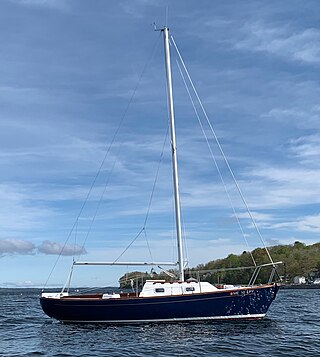Related Research Articles
The Islander 24 Bahama, also called the Islander Bahama 24, is an American trailerable sailboat that was designed by Joseph McGlasson and first built in 1964.
The Balboa 20 is an American trailerable sailboat that was designed by Lyle C. Hess as a cruiser, at the request of Richard Arthur and first built in 1967.
The Buccaneer 240 and Buccaneer 245 are a family of American trailerable sailboats that were both designed as cruisers and first built in 1975.

The Cal 24 is an American trailerable sailboat that was designed by C. William Lapworth as a Midget Ocean Racing Club (MORC) racer and first built in 1958.
The Columbia T-23, or Columbia T23, is an American sailboat that was designed by Australian Alan Payne and first built in 1973. The "T" designation indicates that the boat is designed to be trailerable.
The Ensenada 20 is an American trailerable sailboat that was designed by Lyle C. Hess as a cruiser and first built in 1972.
The ETAP 23 is a Belgian trailerable sailboat that was designed by Jacques de Ridder as a cruiser and first built in 1982.
The Kittiwake 23, also called the Kittiwake 24 and the Kenner Kittiwake, is an American trailerable sailboat that was designed by Carl Alberg as a cruiser and first built in 1966. It is named for the species of gull.
The La Paz 25 is an American trailerable sailboat that was designed by Lyle C. Hess as a motorsailer and first built in 1973.

The Montgomery 15 is an American trailerable sailboat that was designed by Jerry Montgomery as a pocket cruiser and first built in 1980.
The Montgomery 17 is an American trailerable sailboat that was designed by Lyle Hess as a pocket cruiser and daysailer and first built in 1973.
The Morgan 22 is an American trailerable sailboat that was designed by Charley Morgan as a racer-cruiser and first built in 1968.
The Pacific Seacraft 25 is an American trailerable sailboat that was designed by Henry Mohrschladt as a cruiser and first built in 1976.
The Pearson 23 is an American trailerable sailboat that was designed by William Shaw as a cruiser and first built in 1978.

The Quickstep 24 is an American trailerable sailboat that was designed by Edward S. Brewer as a cruiser and first built in 1976.
The RK 20 is an American trailerable sailboat that was designed by Lyle C. Hess as a cruiser and first built in 1972.
The Balboa 26 is an American trailerable sailboat that was designed by Lyle C. Hess as cruiser and first built in 1969.
The Nor'Sea 27, or Norsea 27, is an American trailerable sailboat that was designed by Lyle Hess as cruiser and first built in 1976.
The S2 7.0 is an American trailerable sailboat that was designed by Arthur Edmunds as a cruiser and first built in 1975. The designation indicates the approximate length overall in meters.
The Sovereign 23 and Sovereign 24 are a family of American trailerable sailboats that was designed by Arthur Edmunds as cruisers and first built in 1981.
References
- 1 2 3 4 5 6 McArthur, Bruce (2020). "Montgomery 23 sailboat". sailboatdata.com. Archived from the original on 15 August 2021. Retrieved 15 August 2021.
- ↑ McArthur, Bruce (2021). "Lyle C. Hess 1912 - 2002". sailboatdata.com. Archived from the original on 7 January 2021. Retrieved 15 August 2021.
- 1 2 3 4 5 6 7 8 9 Henkel, Steve: The Sailor's Book of Small Cruising Sailboats, page 238. International Marine/McGraw-Hill, 2010. ISBN 978-0-07-163652-0
- ↑ McArthur, Bruce (2021). "Montgomery Marine Products". sailboatdata.com. Archived from the original on 27 June 2021. Retrieved 15 August 2021.